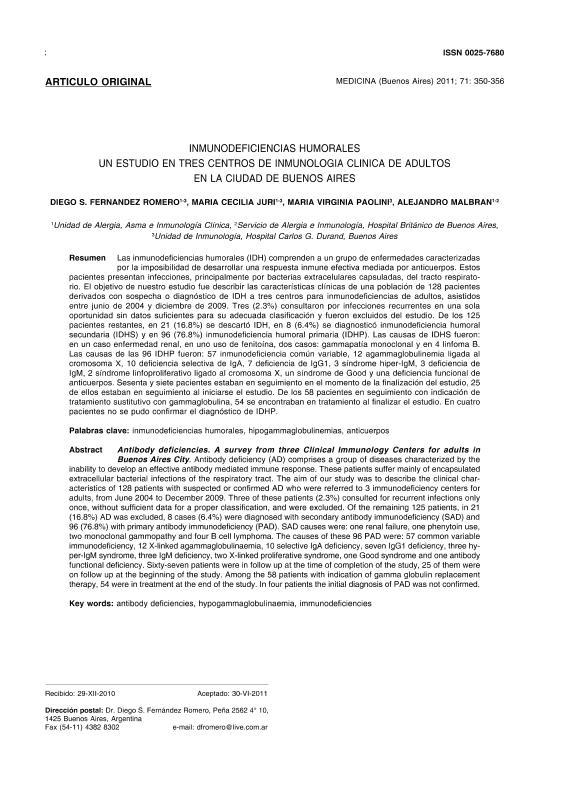Artículo
Las inmunodeficiencias humorales (IDH) comprenden a un grupo de enfermedades caracterizadas por la imposibilidad de desarrollar una respuesta inmune efectiva mediada por anticuerpos. Estos pacientes presentan infecciones, principalmente por bacterias extracelulares capsuladas, del tacto respiratorio. El objetivo de nuestro estudio es describir las características clínicas de una población de 128 pacientes derivados con sospecha o diagnóstico de IDH a 3 centros para inmunodeficiencias de adultos asistidos entre junio de 2004 y diciembre de 2009. Tres (2.3%) consultaron por infecciones recurrentes en una sola oportunidad sin datos suficientes para su adecuada clasificación y fueron excluidos del estudio. De los 125 pacientes restantes, en 21(16.8%) se descartó IDH, en 8 (6.4%) se diagnosticó inmunodeficiencia humoral secundaria (IDHS) y en 96 (76.8%) inmunodeficiencia humoral primaria (IDHP). Las causas de IDHS fueron: 1 enfermedad renal, 1 uso de fenitoína, 2 gammapatía monoclonal y 4 linfoma B. Las causas de las 96 IDHP fueron: 57 inmunodeficiencia común variable, 12 agammaglobulinemia ligada al cromosoma X, 10 deficiencia selectiva de IgA, 7 deficiencia de IgG1, 3 síndromes hiper-IgM, 3 deficiencia de IgM, 2 síndrome linfoproliferativo ligado al cromosoma X, 1 síndrome de Good y 1 deficiencia funcional de anticuerpos. Sesenta y siete pacientes estaban en seguimiento en el momento de la finalización del estudio, 25 de ellos estaban en seguimiento al iniciarse el estudio. De los 58 pacientes en seguimiento con indicación de tratamiento sustitutivo con gamaglobulina, 54 se encontraban en tratamiento al finalizar el estudio. En cuatro pacientes no se pudo confirmar el diagnostico de IDHP. Antibody deficiency (AD) comprises a group of diseases characterized by the inability to develop an effective antibody mediated immune response. These patients suffer mainly of encapsulated extracellular bacterial infections of the respiratory tract. The aim of our study was to describe the clinical characteristics of 128 patients with suspected or confirmed AD who were referred to 3 immunodeficiency centers for adults, from June 2004 to December 2009. Three of these patients (2.3%) consulted for recurrent infections only once, without sufficient data for a proper classification, and were excluded. Of the remaining 125 patients, in 21 (16.8%) AD was excluded, 8 cases (6.4%) were diagnosed with secondary antibody immunodeficiency (SAD) and 96 (76.8%) with primary antibody immunodeficiency (PAD). SAD causes were: one renal failure, one phenytoin use, two monoclonal gammopathy and four B cell lymphoma. The causes of these 96 PAD were: 57 common variable immunodeficiency, 12 X-linked agammaglobulinaemia, 10 selective IgA deficiency, seven IgG1 deficiency, three hyper-IgM syndrome, three IgM deficiency, two X-linked proliferative syndrome, one Good syndrome and one antibody functional deficiency. Sixty-seven patients were in follow up at the time of completion of the study, 25 of them were on follow up at the beginning of the study. Among the 58 patients with indication of gamma globulin replacement therapy, 54 were in treatment at the end of the study. In four patients the initial diagnosis of PAD was not confirmed.
Inmunodeficiencias humorale: Un estudio en tres centros de inmunología de adultos de la Ciudad de Buenos Aires
Título:
Antibody deficiencies: A survey from three Clinical Immunology Centers for adults in Buenos Aires City
Fecha de publicación:
04/2011
Editorial:
Medicina (Buenos Aires)
Revista:
Medicina (Buenos Aires)
ISSN:
0025-7680
e-ISSN:
1669-9106
Idioma:
Español
Tipo de recurso:
Artículo publicado
Clasificación temática:
Resumen
Palabras clave:
HIPOGAMAGLOBULINEMIAS
,
INMUNODEFICIENCIAS
,
HUMORALES
,
ANTICUERPOS
Archivos asociados
Licencia
Identificadores
Colecciones
Articulos(SEDE CENTRAL)
Articulos de SEDE CENTRAL
Articulos de SEDE CENTRAL
Citación
Fernández Romero, Diego S.; Juri, María Cecilia; Paolini, María Virginia; Malbrán, Alejandro; Inmunodeficiencias humorale: Un estudio en tres centros de inmunología de adultos de la Ciudad de Buenos Aires; Medicina (Buenos Aires); Medicina (Buenos Aires); 71; 4; 4-2011; 350-356
Compartir




